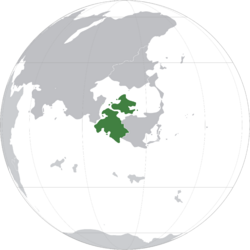Songha: Difference between revisions
mNo edit summary |
No edit summary |
||
| Line 25: | Line 25: | ||
|national_languages = <!--Country/territory-wide languages recognised but not necessarily in country/territory-wide law, etc--> | |national_languages = <!--Country/territory-wide languages recognised but not necessarily in country/territory-wide law, etc--> | ||
|regional_languages = <!--Languages recognised or associated with particular regions within the country/territory--> | |regional_languages = <!--Languages recognised or associated with particular regions within the country/territory--> | ||
|ethnic_groups = 92% [[Songhese (People)|Songhese]], | |ethnic_groups = 92% [[Songhese (People)|Songhese]], 6% [[Loka People|Loka]], 2% Other | ||
|ethnic_groups_year = 2016 | |ethnic_groups_year = 2016 | ||
|demonym = Songhese | |demonym = Songhese | ||
Revision as of 06:01, 7 December 2020
This article is incomplete because it is pending further input from participants, or it is a work-in-progress by one author. Please comment on this article's talk page to share your input, comments and questions. Note: To contribute to this article, you may need to seek help from the author(s) of this page. |
Empire of Songha Cin'Txan Na Songhe, ᡂᠢᠨ᠋ᠲᠱᠠᠨ ᠩᠠ ᠰᠥᠨᠭᠬᠡ | |
|---|---|
 | |
| Capital | K'an-Hsia (Royal Capital), Liu-Hu (Administrative Capital) |
| Largest city | Jiasing |
| Official languages | Songhese |
| Ethnic groups (2016) | 92% Songhese, 6% Loka, 2% Other |
| Demonym(s) | Songhese |
| Government | Absolute Monarchy |
• Empress | La'akea Yungai-Seung |
| Legislature | Imperial Assembly |
| Imperial Council | |
| Imperial Chamber | |
| Establishment | |
| 567 AD | |
| Population | |
• 2020 estimate | 191,000,000 |
• 2020 census | 189,432,430 |
| GDP (PPP) | 2014 estimate |
• Total | 3.786 Trillion |
• Per capita | $19,824 |
| GDP (nominal) | 2020 estimate |
• Total | 2.310 Trillion |
• Per capita | 12,098 |
| HDI (2020) | high |
| Driving side | left |
| Internet TLD | .sg |
Songha (soŋ-hɑ; Songhese: Songhe, ᠰᠥᠨᠭᠬᠡ), officially the Empire of Songha is a sovereign state in Isuan, in the Eastern hemisphere of Levilion. The Empire of Songha governs over its mainland, dominated by the Bai'akisa Mountain Range in the Center, the Ch’i-ti Marshes in the West, the Maizhou Plains in the South, as well as the Ta-Puia Archipelago, the largest archipelago in Songha. To the West, it borders the inland Straits of Qes, which drain into the Sea of Qes on it's Northern border. To the East, it borders XXXX, while in the exclaved territory of Hmukeaathale, it borders XXXX. Songha is a high population nation, with 189 million people as of the 2016 census. K'an-Hsia is the Royal Capital of Songha, while the rest of the government buildings reside in the city of Liu-Hu.
Songha is the most populous nation in Isuan, and the second largest, with its population largely concentrated in the lowlying areas around the central Bai'akisa Mountains. Songha's strategic position, straddling both the Sea of Qes and the Straits of Qes, affords it a hefty amount of regional influence.
History
Pre-Historic Era
Inhabitation of the area now known as Songha can date back over 25,000 years, with evidence of nomadic hunter-gatherer cultures examined by archeologists.
Pre-Unification [2000 BC - 450 AD]
Warring Kingdoms Era [200 AD - 450 AD]
The Warring Kingdoms Era was an era in Songhese History of widespread warfare, as well as bureaucratic and military reform that would eventually lead to the formation of the Empire of Songha. As a result of inconsistent and missing written records, scholars cannot fully agree on the timeframe of the Warring Kingdoms Era; however, in Songhese Curriculum, students are taught the Warring Kingdoms Era begins in 212 AD with the outbreak of war between the Southern Kingdoms of Shui-T'ien and Erh-Ts'en-Hang, and transitions into the "Unification Wars of Songha" in 439 AD, when the Seung Dynasty invades and captures Lunya, modern day Liu-Hu.

